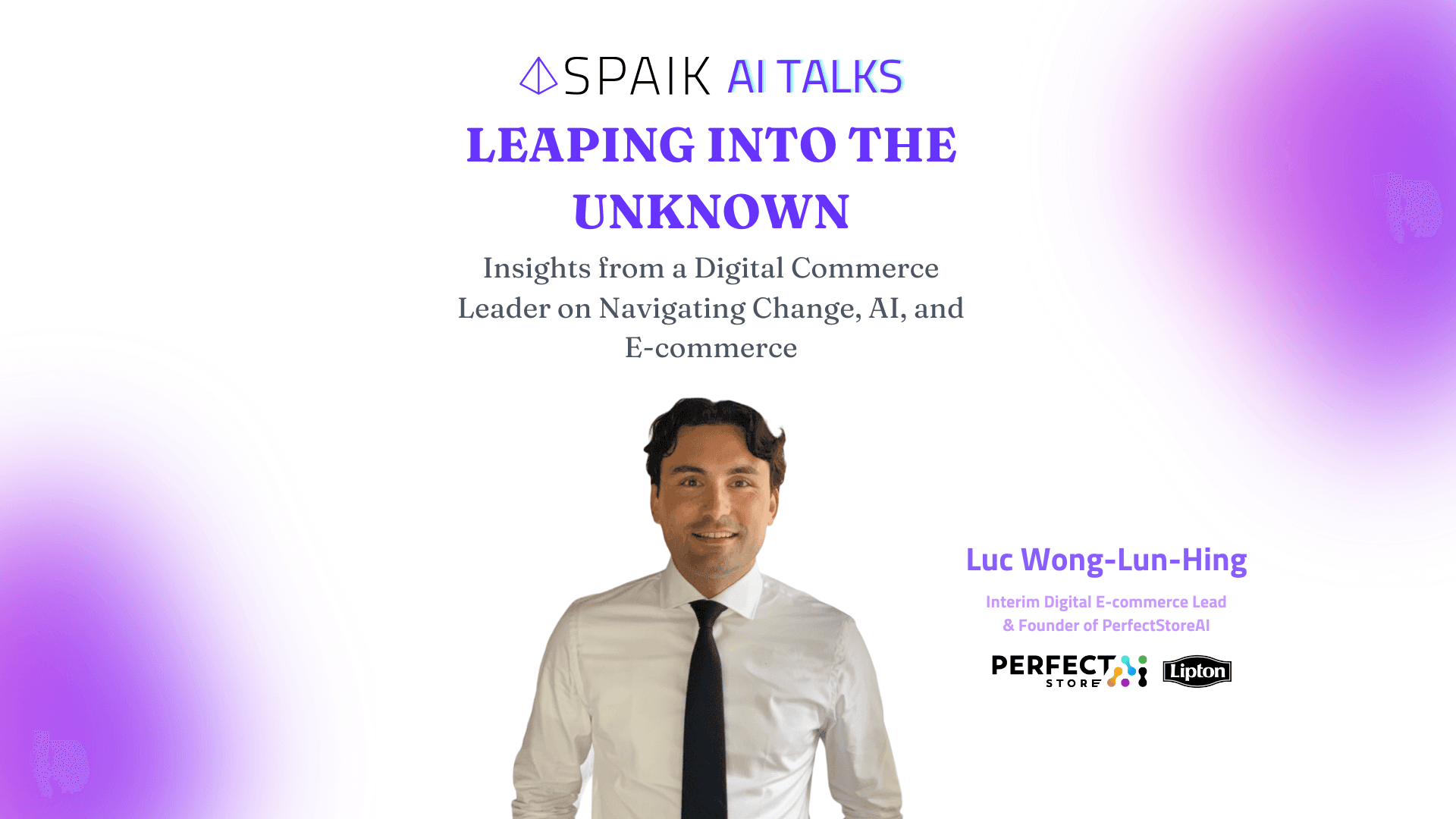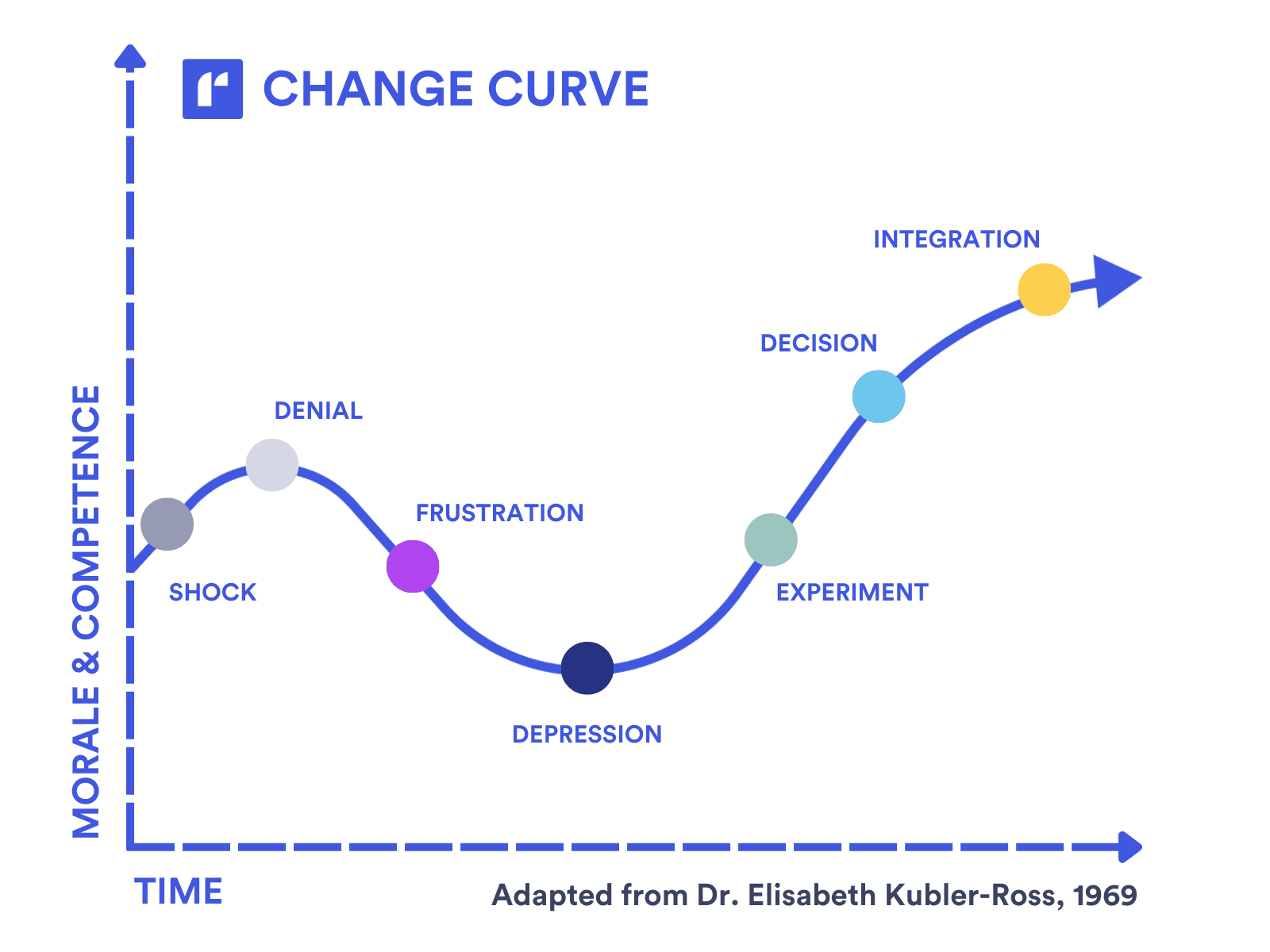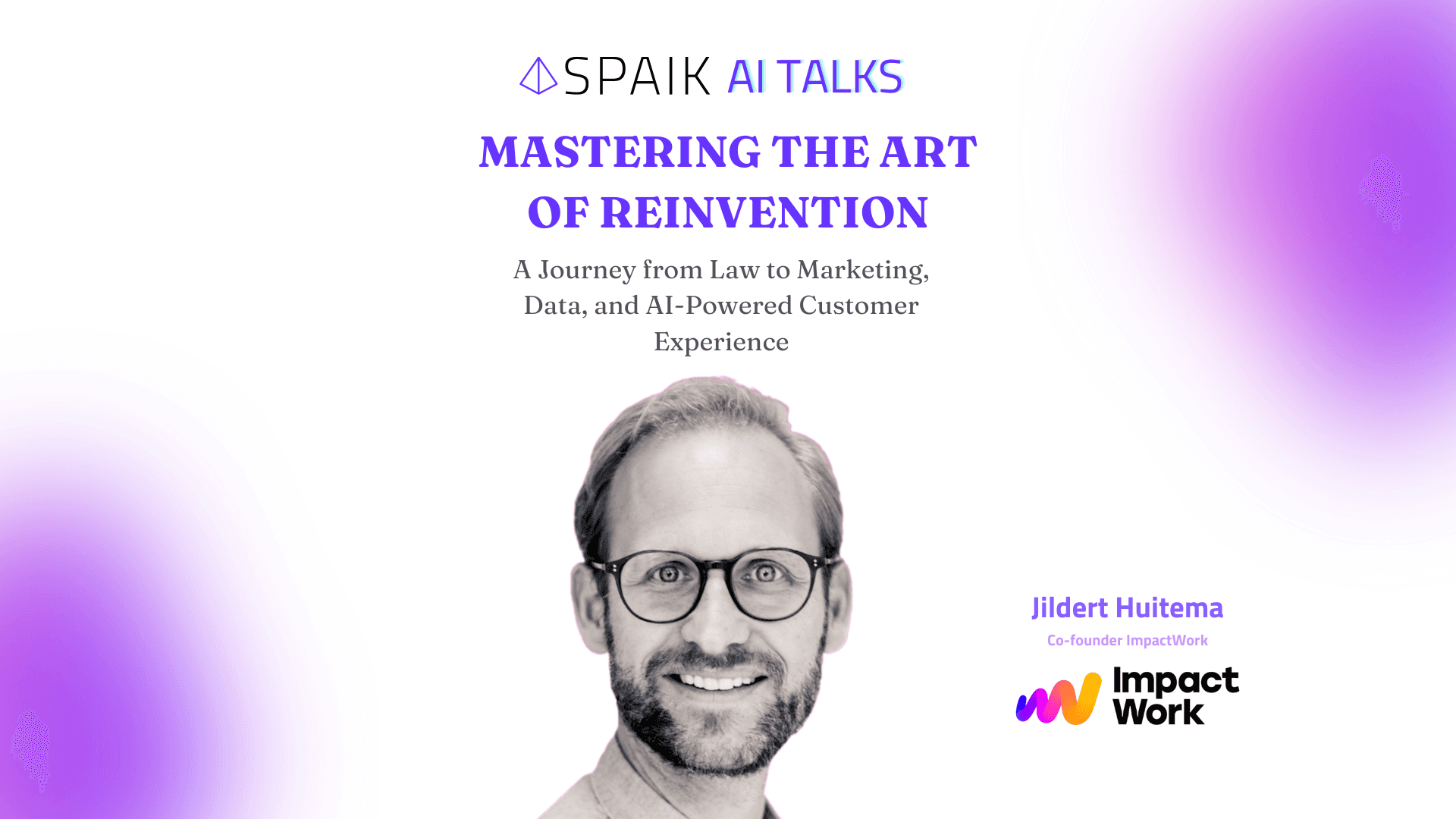SPAIK Talk: Leaping into the Unknown
Luc Wong's journey - Embracing Change through Digital Innovation
Jul 16, 2024
SPAIK Talk: Leaping into the Unknown
Luc Wong's journey - Embracing Change through Digital Innovation
Jul 16, 2024
SPAIK Talk: Leaping into the Unknown
Luc Wong's journey - Embracing Change through Digital Innovation
Jul 16, 2024



Luc Wong-Lun-Hing is a dynamic digital commerce leader with a track record of driving innovation and transformation at renowned companies like FrieslandCampina, Reckitt, and Red Bull. His career highlights include successfully building FrieslandCampina's e-commerce business in Singapore from the ground up, leading to significant improvements in CRM strategies and conversion rates. At Reckitt, Luc managed the e-commerce P&L for Singapore, overseeing 27 brands and driving business growth across numerous online platforms. His leadership in cross-functional team management and strategic execution has consistently delivered impressive results.
In 2023, Luc founded PerfectStore AI to tackle the manual optimisation of product pages, using AI to automate and enhance performance. He also leads Omni Digital Commerce, offering strategic consulting to elevate digital commerce capabilities. Luc's forward-thinking vision for AI in e-commerce advocates for a balanced integration of human creativity and AI efficiency, predicting a hybrid capabilities model. His leadership philosophy emphasises a test-and-learn mindset, enabling teams and celebrating incremental successes, making him a prominent figure in digital omnichannel commerce.
It was all about diving in headfirst and learning from every experience, good or bad. That ability to be comfortable with the uncomfortable has stayed with me until today. Seeing change as the status quo has been a significant lesson I took from it.
What has been a significant change in your life, and how did you adapt to it?
Moving to Singapore with my wife in 2018 was a massive change for me, personally and professionally. I took on the role of head of e-commerce for FrieslandCampina in the Singapore market, tasked with setting up the business from scratch. It was a leap into the unknown, navigating a completely different culture, way of working, and communication style. Though I encountered multiple challenges, each experience was a valuable lesson in self-discovery, effective communication, and appreciating the beauty of diversity. That ability to be comfortable with the uncomfortable has stayed with me until today. Seeing change as the status quo has been a significant lesson I took from it.
How has your approach to change and innovation shaped your career?
My approach has evolved greatly throughout my career, especially after training on self-awareness and communication styles. I learned about the transition curve of change, which helped me recognise when I'm in a change process. It starts with unconsciously noticing that something is different, which can manifest as surprise, irritation, or blaming others. But once you consciously realise that you've changed or the situation around you has changed, you can start evaluating how to adapt. It's about having that core stability and self-knowledge to navigate the "storm" of change. Singapore accelerated this mindset for me, being constantly exposed to diverse perspectives and the drive to innovate.

It's about enabling people and celebrating the wins along the way.
What lessons from your experience at FrieslandCampina/Reckitt have stuck with you?
At FrieslandCampina, I learned the importance of bringing people along in the journey of change. Implementing a new loyalty program with unique product packaging codes required aligning 15-20 factories and convincing brand teams of the value. Initially, there was a lot of resistance, seeing it as an unwelcome complexity. The key was taking it step by step, being concrete about the benefits, and sharing successes to create a snowball effect. It taught me the power of test-and-learn, being more iterative, and not needing everything to be perfect from the start. It's about enabling people and celebrating the wins along the way.
How have you applied your learnings to your own venture, Perfect Store AI?
With PerfectStore AI, I wanted to solve a pain point I encountered—the manual, time-consuming process of optimising product pages for conversion. For example, when working at Reckitt, I saw this practical operational challenge of optimising thousands of listings across 27 brands and 30 online shops. I knew AI and automation could streamline this, but it required much cross-functional knowledge, often siloed in the organisation.
Many agencies lack the commercial understanding to measure success beyond campaign visuals and shallow metrics. The PerfectstoreAI approach distilled the process into 4-5 interconnected and automated steps enriched with AI, focused on increasing commercial success, sales, and operational efficiencies. This, in turn, means faster and easier experimentation. It provides a cross-functional perspective often missing in e-commerce initiatives.
What have you learned about AI and e-commerce through developing this tool?
While AI capabilities rapidly advance, adoption remains low, even among large companies. The key is aligning AI solutions with relevant use cases rather than a generalised approach. Our core use case is optimizing product pages before expanding to other AI features. So far, we have learned much about the necessary data, technology, and user experiences, collaborating closely with some major FMCG brands.
Building the tool myself was immensely valuable for gaining depth and seeking input through an iterative process. It reinforced the importance of keeping an open mindset, bringing elements together, and not letting challenges hinder progress. Consistently envisioning the long-term AI potential while taking measured steps forward is crucial.
We'll see an increasing hybridisation of human and AI capabilities, with a necessary balance struck between control and empowerment. It's about augmenting human creativity and commercial acumen with AI's predictive power and efficiency.
Looking forward, how do you see the integration of AI in e-commerce evolving?
We'll see an increasing hybrid form of human and AI capabilities, with a necessary balance struck between control and empowerment. There will be more regulation around data privacy and AI transparency (e.g. EU AI Act, Digital Services Act (DSA) and GDPR).
For businesses, the key will be having digitally-native leaders who can articulate a digital & AI vision, embrace a test-and-learn mindset, and thoughtfully embed AI across the value chain. It's about augmenting human creativity and commercial acumen with AI's predictive power and efficiency. We need to strive for that sweet spot where AI is truly adding value for people and organizations. The specific configuration will keep evolving, but that balance is paramount. Exciting times ahead, for sure!
Luc Wong-Lun-Hing is a dynamic digital commerce leader with a track record of driving innovation and transformation at renowned companies like FrieslandCampina, Reckitt, and Red Bull. His career highlights include successfully building FrieslandCampina's e-commerce business in Singapore from the ground up, leading to significant improvements in CRM strategies and conversion rates. At Reckitt, Luc managed the e-commerce P&L for Singapore, overseeing 27 brands and driving business growth across numerous online platforms. His leadership in cross-functional team management and strategic execution has consistently delivered impressive results.
In 2023, Luc founded PerfectStore AI to tackle the manual optimisation of product pages, using AI to automate and enhance performance. He also leads Omni Digital Commerce, offering strategic consulting to elevate digital commerce capabilities. Luc's forward-thinking vision for AI in e-commerce advocates for a balanced integration of human creativity and AI efficiency, predicting a hybrid capabilities model. His leadership philosophy emphasises a test-and-learn mindset, enabling teams and celebrating incremental successes, making him a prominent figure in digital omnichannel commerce.
It was all about diving in headfirst and learning from every experience, good or bad. That ability to be comfortable with the uncomfortable has stayed with me until today. Seeing change as the status quo has been a significant lesson I took from it.
What has been a significant change in your life, and how did you adapt to it?
Moving to Singapore with my wife in 2018 was a massive change for me, personally and professionally. I took on the role of head of e-commerce for FrieslandCampina in the Singapore market, tasked with setting up the business from scratch. It was a leap into the unknown, navigating a completely different culture, way of working, and communication style. Though I encountered multiple challenges, each experience was a valuable lesson in self-discovery, effective communication, and appreciating the beauty of diversity. That ability to be comfortable with the uncomfortable has stayed with me until today. Seeing change as the status quo has been a significant lesson I took from it.
How has your approach to change and innovation shaped your career?
My approach has evolved greatly throughout my career, especially after training on self-awareness and communication styles. I learned about the transition curve of change, which helped me recognise when I'm in a change process. It starts with unconsciously noticing that something is different, which can manifest as surprise, irritation, or blaming others. But once you consciously realise that you've changed or the situation around you has changed, you can start evaluating how to adapt. It's about having that core stability and self-knowledge to navigate the "storm" of change. Singapore accelerated this mindset for me, being constantly exposed to diverse perspectives and the drive to innovate.

It's about enabling people and celebrating the wins along the way.
What lessons from your experience at FrieslandCampina/Reckitt have stuck with you?
At FrieslandCampina, I learned the importance of bringing people along in the journey of change. Implementing a new loyalty program with unique product packaging codes required aligning 15-20 factories and convincing brand teams of the value. Initially, there was a lot of resistance, seeing it as an unwelcome complexity. The key was taking it step by step, being concrete about the benefits, and sharing successes to create a snowball effect. It taught me the power of test-and-learn, being more iterative, and not needing everything to be perfect from the start. It's about enabling people and celebrating the wins along the way.
How have you applied your learnings to your own venture, Perfect Store AI?
With PerfectStore AI, I wanted to solve a pain point I encountered—the manual, time-consuming process of optimising product pages for conversion. For example, when working at Reckitt, I saw this practical operational challenge of optimising thousands of listings across 27 brands and 30 online shops. I knew AI and automation could streamline this, but it required much cross-functional knowledge, often siloed in the organisation.
Many agencies lack the commercial understanding to measure success beyond campaign visuals and shallow metrics. The PerfectstoreAI approach distilled the process into 4-5 interconnected and automated steps enriched with AI, focused on increasing commercial success, sales, and operational efficiencies. This, in turn, means faster and easier experimentation. It provides a cross-functional perspective often missing in e-commerce initiatives.
What have you learned about AI and e-commerce through developing this tool?
While AI capabilities rapidly advance, adoption remains low, even among large companies. The key is aligning AI solutions with relevant use cases rather than a generalised approach. Our core use case is optimizing product pages before expanding to other AI features. So far, we have learned much about the necessary data, technology, and user experiences, collaborating closely with some major FMCG brands.
Building the tool myself was immensely valuable for gaining depth and seeking input through an iterative process. It reinforced the importance of keeping an open mindset, bringing elements together, and not letting challenges hinder progress. Consistently envisioning the long-term AI potential while taking measured steps forward is crucial.
We'll see an increasing hybridisation of human and AI capabilities, with a necessary balance struck between control and empowerment. It's about augmenting human creativity and commercial acumen with AI's predictive power and efficiency.
Looking forward, how do you see the integration of AI in e-commerce evolving?
We'll see an increasing hybrid form of human and AI capabilities, with a necessary balance struck between control and empowerment. There will be more regulation around data privacy and AI transparency (e.g. EU AI Act, Digital Services Act (DSA) and GDPR).
For businesses, the key will be having digitally-native leaders who can articulate a digital & AI vision, embrace a test-and-learn mindset, and thoughtfully embed AI across the value chain. It's about augmenting human creativity and commercial acumen with AI's predictive power and efficiency. We need to strive for that sweet spot where AI is truly adding value for people and organizations. The specific configuration will keep evolving, but that balance is paramount. Exciting times ahead, for sure!
Luc Wong-Lun-Hing is a dynamic digital commerce leader with a track record of driving innovation and transformation at renowned companies like FrieslandCampina, Reckitt, and Red Bull. His career highlights include successfully building FrieslandCampina's e-commerce business in Singapore from the ground up, leading to significant improvements in CRM strategies and conversion rates. At Reckitt, Luc managed the e-commerce P&L for Singapore, overseeing 27 brands and driving business growth across numerous online platforms. His leadership in cross-functional team management and strategic execution has consistently delivered impressive results.
In 2023, Luc founded PerfectStore AI to tackle the manual optimisation of product pages, using AI to automate and enhance performance. He also leads Omni Digital Commerce, offering strategic consulting to elevate digital commerce capabilities. Luc's forward-thinking vision for AI in e-commerce advocates for a balanced integration of human creativity and AI efficiency, predicting a hybrid capabilities model. His leadership philosophy emphasises a test-and-learn mindset, enabling teams and celebrating incremental successes, making him a prominent figure in digital omnichannel commerce.
It was all about diving in headfirst and learning from every experience, good or bad. That ability to be comfortable with the uncomfortable has stayed with me until today. Seeing change as the status quo has been a significant lesson I took from it.
What has been a significant change in your life, and how did you adapt to it?
Moving to Singapore with my wife in 2018 was a massive change for me, personally and professionally. I took on the role of head of e-commerce for FrieslandCampina in the Singapore market, tasked with setting up the business from scratch. It was a leap into the unknown, navigating a completely different culture, way of working, and communication style. Though I encountered multiple challenges, each experience was a valuable lesson in self-discovery, effective communication, and appreciating the beauty of diversity. That ability to be comfortable with the uncomfortable has stayed with me until today. Seeing change as the status quo has been a significant lesson I took from it.
How has your approach to change and innovation shaped your career?
My approach has evolved greatly throughout my career, especially after training on self-awareness and communication styles. I learned about the transition curve of change, which helped me recognise when I'm in a change process. It starts with unconsciously noticing that something is different, which can manifest as surprise, irritation, or blaming others. But once you consciously realise that you've changed or the situation around you has changed, you can start evaluating how to adapt. It's about having that core stability and self-knowledge to navigate the "storm" of change. Singapore accelerated this mindset for me, being constantly exposed to diverse perspectives and the drive to innovate.

It's about enabling people and celebrating the wins along the way.
What lessons from your experience at FrieslandCampina/Reckitt have stuck with you?
At FrieslandCampina, I learned the importance of bringing people along in the journey of change. Implementing a new loyalty program with unique product packaging codes required aligning 15-20 factories and convincing brand teams of the value. Initially, there was a lot of resistance, seeing it as an unwelcome complexity. The key was taking it step by step, being concrete about the benefits, and sharing successes to create a snowball effect. It taught me the power of test-and-learn, being more iterative, and not needing everything to be perfect from the start. It's about enabling people and celebrating the wins along the way.
How have you applied your learnings to your own venture, Perfect Store AI?
With PerfectStore AI, I wanted to solve a pain point I encountered—the manual, time-consuming process of optimising product pages for conversion. For example, when working at Reckitt, I saw this practical operational challenge of optimising thousands of listings across 27 brands and 30 online shops. I knew AI and automation could streamline this, but it required much cross-functional knowledge, often siloed in the organisation.
Many agencies lack the commercial understanding to measure success beyond campaign visuals and shallow metrics. The PerfectstoreAI approach distilled the process into 4-5 interconnected and automated steps enriched with AI, focused on increasing commercial success, sales, and operational efficiencies. This, in turn, means faster and easier experimentation. It provides a cross-functional perspective often missing in e-commerce initiatives.
What have you learned about AI and e-commerce through developing this tool?
While AI capabilities rapidly advance, adoption remains low, even among large companies. The key is aligning AI solutions with relevant use cases rather than a generalised approach. Our core use case is optimizing product pages before expanding to other AI features. So far, we have learned much about the necessary data, technology, and user experiences, collaborating closely with some major FMCG brands.
Building the tool myself was immensely valuable for gaining depth and seeking input through an iterative process. It reinforced the importance of keeping an open mindset, bringing elements together, and not letting challenges hinder progress. Consistently envisioning the long-term AI potential while taking measured steps forward is crucial.
We'll see an increasing hybridisation of human and AI capabilities, with a necessary balance struck between control and empowerment. It's about augmenting human creativity and commercial acumen with AI's predictive power and efficiency.
Looking forward, how do you see the integration of AI in e-commerce evolving?
We'll see an increasing hybrid form of human and AI capabilities, with a necessary balance struck between control and empowerment. There will be more regulation around data privacy and AI transparency (e.g. EU AI Act, Digital Services Act (DSA) and GDPR).
For businesses, the key will be having digitally-native leaders who can articulate a digital & AI vision, embrace a test-and-learn mindset, and thoughtfully embed AI across the value chain. It's about augmenting human creativity and commercial acumen with AI's predictive power and efficiency. We need to strive for that sweet spot where AI is truly adding value for people and organizations. The specific configuration will keep evolving, but that balance is paramount. Exciting times ahead, for sure!
Other posts
We help you achieve the most potential out of AI. We train, find use cases and help you build them inside your worfklow.
We help you achieve the most potential out of AI. We train, find use cases and help you build them inside your worfklow.



